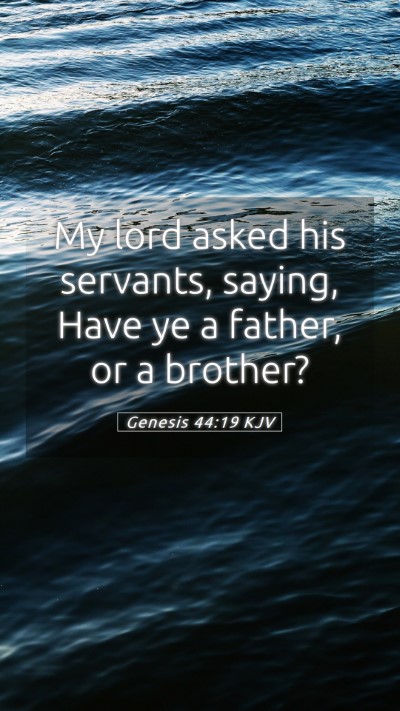Understanding Genesis 44:19
Genesis 44:19 reads:
“My lord asked his servants, saying, ‘Have ye a father, or a brother?’”
This verse occurs within a significant narrative in the book of Genesis, where Joseph, now a powerful figure in Egypt, interacts with his brothers who had come to buy grain during a severe famine. The context of this verse offers deep insights and interpretations that can enhance our understanding of the scripture.
Meaning of Genesis 44:19
This verse captures the moment when Joseph initiates a conversation that later reveals his identity to his brothers. It reflects themes of family, responsibility, and reconciliation. Here are some key points derived from public domain commentaries:
- Contextual Relevance: Joseph's questioning signifies an attempt to uncover the character of his brothers since their previous actions had resulted in significant familial discord.
- Significance of Inquiry: By asking about their family, Joseph is not merely fulfilling a formal inquiry but probing deeper into their connections and changes since they last met.
- Cultural Implications: In ancient times, lineage and family ties were foundational elements of identity; thus, Joseph's question touches upon pivotal social norms of the period.
Bible Verse Explanations
The question directed by Joseph resonates with his own personal history of betrayal and longing for family unity. Matthew Henry notes that Joseph’s inquiry was tactful, revealing his purpose to test his brothers’ integrity and repentance.
Albert Barnes states that the brothers' response reveals their state of vulnerability and awareness of their past sins. They now stand before their brother, who is in a position of power, highlighting the drama of remorse and fear intertwined with familial love.
Adam Clarke emphasizes that the inquiry about their father and brother serves to remind the brothers of their neglect towards family duties, raising tensions that lead to eventual revelation and reconciliation.
In-Depth Bible Verse Analysis
This verse serves as a critical juncture in the Joseph narrative, marking the moment prior to the revelation of his identity. The question reflects his emotional state—one filled with hope to restore familial bonds amidst the betrayal he experienced.
Furthermore, Genesis 44:19 functions as a microcosm of larger biblical themes, such as the divine orchestration of circumstances for reconciliation. As we delve into scripture analysis, understanding this verse provides a lens through which we can better perceive themes of redemption throughout the biblical text.
Cross References
To deepen our understanding of this passage, consider these related verses:
- Genesis 37:28: The initial selling of Joseph by his brothers, which sets the stage for the current familial dynamics.
- Genesis 42:36: Jacob’s despair over the loss of Joseph and his other son, which highlights the gravity of familial bonds.
- Genesis 45:3: Joseph's eventual revelation of his identity to his brothers, stressing the culmination of this narrative arc.
Application of Genesis 44:19
In applying the lessons of Genesis 44:19 to daily life, one can reflect on the importance of family connections and the potential for reconciliation, even after deep wounds. It encourages readers to think about their actions toward family and the importance of communication and understanding.
By engaging with this verse, individuals can explore Bible study insights that enhance their spiritual journey and cultivate meaningful discussions within Bible study groups. The historical and cultural context provided by commentaries informs our interpretation and fosters a deeper understanding of Scripture.
Conclusion
Genesis 44:19 is a profound verse that intricately weaves themes of inquiry, familial responsibility, and reconciliation within the narrative of Joseph. It embodies the process of self-reflection and the necessity of addressing past grievances to foster healing. For those embarking on in-depth Bible verse analysis or seeking Bible study lessons, this verse offers rich material for contemplation and dialogue.


